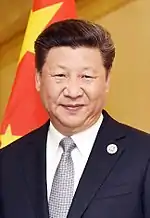Confidence doctrine
The Confidence Doctrine (Chinese: 自信论) is a signature political philosophy of Xi Jinping, General Secretary of the Communist Party of China.[1] It calls for Communist Party members, government officials, and the Chinese people to be "confident in our chosen path, confident in our guiding theories, confident in our political system, and confident in our culture." Officially, the doctrine is termed Four matters of confidence (四个自信).[2][3]
History
The doctrine was first discussed at the 18th Party Congress held in November 2012 in a speech by then party General Secretary Hu Jintao, and the doctrine was termed the Three Confidences (三个自信). The origin of the theory is said to be Yi Junqing, an official later disgraced for corruption who served as the head of the Compilation and Translation Bureau.[1] Xi Jinping added a 'fourth' confidence, "confidence in our culture," in December 2014.[4][5] Along with the Four Comprehensives and the Chinese Dream, it has, since 2013, become a central theme in political slogans of the Communist Party of China, often recited at official meetings, conferences, and by state-owned media.[2]
In 2017, the 19th CPC National Congress added the Four Confidences to the party's constitution, inserting "firm confidence in its path, theory, system, and culture," along with other doctrines proposed by Xi Jinping.[6] The Decision of the Fourth Plenary Session of the 19th Central Committee of the CPC, after expounding the "remarkable advantages" (显著优势) of China's national system and system of governance in 13 aspects, states, "These remarkable advantages are the basis for our firm confidence in the path, theory, system and culture of Socialism with Chinese characteristics."[7]
According to several portraits of Xi by both domestic and foreign observers, Xi Jinping has a deeply held belief that the Communist Party and the institutions it has created is the best institution to govern China and the best institution to guide China's development.[8] Throughout the period that the Communist Party was the ruling party of China, the party has constantly faced challenges and doubts, both domestically and internationally, about its continuing legitimacy to govern, and pressures for political reform. While the Communist Party has long criticized "western-style democracy and separation of powers" as unsuitable for the Chinese environment, the Confidence Doctrine introduces a novel approach to the issue by emphasizing self-confidence over the criticism of external forces.
Doctrine
Characteristics of the Four Matters of Confidence
Four matters of confidence refer to confidence in the path, theory, system, and culture of socialism with Chinese characteristics.[9] According to an official translation:[9]
"Confidence in its path" is confidence in the direction of development of socialism with Chinese characteristics and confidence in its future; "confidence in its theory" is confidence in the scientific nature... of the theory of socialism with Chinese characteristics; "confidence in its system" is confidence in the advanced and superior nature of the system of Chinese socialism; "confidence in its culture" is a full affirmation of the value of China's own culture and a faith in its vitality. These four form an organic whole; they provide a complete conceptual system of socialism with Chinese characteristics.
The CPC believes that China's national system and system of governance are guided by Marxism and have deep roots in Chinese culture, formed through the unique experience of the CPC and the Chinese people, and are "deeply supported by the people."[7] To promote institution-building, the CPC believes it to be necessary to study and learn from the "useful achievements of foreign systems and civilizations, but not to copy foreign models," deviating from China's "national conditions and historical culture."[7]
Advantages of China's System of Governance
According to the theory of the Communist Party of China, China's national system and system of governance have significant advantages and are the basic basis for the "four self-confidence".[10] According to the Decision of the Fourth Plenary Session of the 19th Central Committee of the CPC, China's national system and system of governance have remarkable advantages in 13 areas, including: the leadership of the party, political stability, ability to mobilize for major projects, flexibility and adaptation, the combination of socialism and market characteristics, increase of people's welfare and standard of living, socialist rule of law, party's leadership over the military, equality of the different nationalities, and the combination of independence and openness to the outside world.[10]
The Chinese Communist Party believes that China's rapid economic development and long-term social stability have demonstrated the "remarkable advantages" of its national system and system of governance, namely:[7]
- Rapid economic development: in the more than 70 years since the establishment of the PRC, and especially since reform and opening, China has experienced rapid economic development that is rare in the world, becoming the world's second largest economy, the largest manufacturing power, the largest trading power in goods and has the largest foreign exchange reserve, and entering the world's forefront in economic strength, scientific and technological strength, national defence strength and comprehensive national power. The largest and most growing middle-income group in the world has been formed. The people's well-being in the areas of employment, education, health care, housing, old age and social security has continued to improve.
- Long-term social stability: China has maintained long-term social harmony and stability, and its people live and work in peace and contentment, making it "one of the countries recognized by the international community as having the greatest sense of security."
The Advantages of China's System Demonstrated through the Coronavirus Pandemic
The CPC believes that China's performance in containing the 2019-2020 coronavirus pandemic, which demonstrates China's efficient mobilization and organizational coordination, reflects the superiority of China's national governance capacity and the advantages of the CPC's leadership.[11] After the start of the epidemic caused by the novel coronavirus, the Party Central Committee made "swift decisions" to carry out a comprehensive range of actions, including treatment of patients, scientific research, production and transportation of material, public opinion guidance, traffic control and social isolation, while also coordinating the domestic prevention and control of the epidemic, economic and social development, and international cooperation.[11]
An article by the CPC notes that the fight against the coronavirus pandemic demonstrates two of China's institutional strengths:[11]
- The Party exercises comprehensive overall leadership. The Party Central Committee, in accordance with democratic centralism, exercises unified command and control over party committees and governments on all levels. The Party Committee can oversee the situation and coordinate all parties, including coordinating the legislature, the government, the CPPCC and other institutions at all levels, and can fully mobilize manpower and allocate resources. From the central government to the local level and then to the grassroots level, including enterprises, villages, communities, schools and social organizations, party organizations are omnipresent and carries out the will of the Party.
- China is a unitary state. The State Council ordered local governments to prevent and control the epidemic based on a central plan. This includes requiring local governments to send medical teams and provide medical equipment to assist Wuhan and Hubei province. In contrast to the situation abroad, the Chinese Communist Party believes that this can only be done under China's national system and ability to divert the entire national capacity in important projects.
References
- Lin, Baohua (May 22, 2013). ""七个不讲"否定"三个自信"(林保华)". Radio Free Asia.
- "以"四个自信"推进新时代中国特色社会主义伟大事业-新华网". www.xinhuanet.com. Retrieved 2020-04-27.
- "外译发布机制 _ China.org.cn". keywords.china.org.cn. Retrieved 2020-04-27.
- "习近平灵机一动 立马改了"三个自信"(图)". Duowei News. Boxun. December 23, 2014.
- 冯鹏志. "从"三个自信"到"四个自信"--理论-人民网". CCP News. 学习时报. Retrieved 24 May 2017.
- "Constitution of the Communist Party of China" (PDF). China Internet Information Center.
- "人民日报整版讨论:坚定"四个自信"的基本依据--观点--人民网". opinion.people.com.cn. Retrieved 2020-04-27.
- Osnos, Evan (April 6, 2015). "Born Red: How Xi Jinping, an unremarkable provincial administrator, became China's most authoritarian leader since Mao". The New Yorker.
- "【中英文对照】中国共产党第十九次全国代表大会关于十八届中央纪委工作报告的决议_中国翻译研究院". www.catl.org.cn. Retrieved 2020-04-27.
- "显著优势是坚定"四个自信"的基本依据". www.bjd.com.cn. Retrieved 2020-04-27.
- "【中国稳健前行】抗疫展现中国高效动员力组织力协调力 - 求是网". www.qstheory.cn. Retrieved 2020-04-27.


.svg.png.webp)